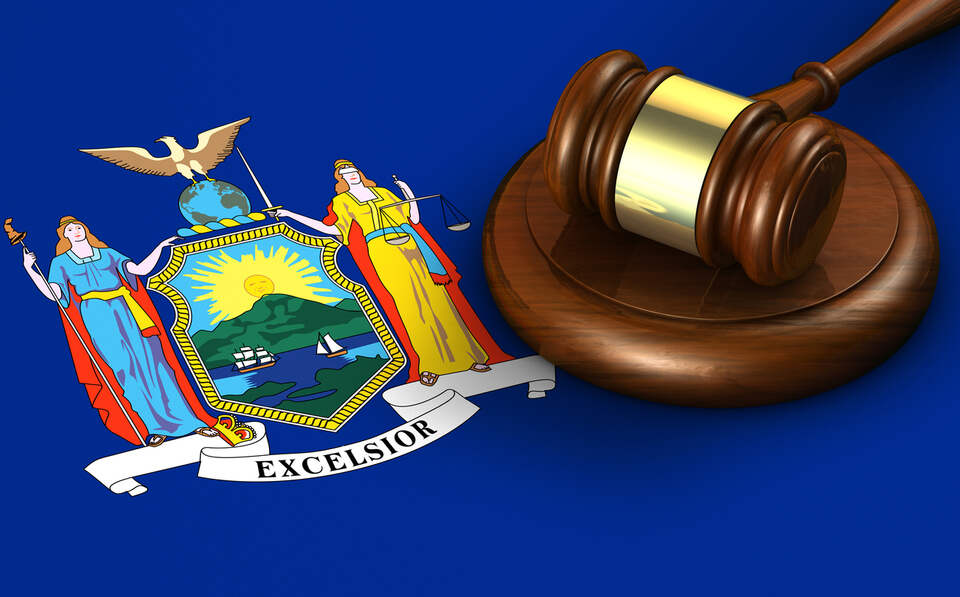
The Final Countdown
The New York State Legislature has passed a bill that could wipe out online sweepstakes casinos from the Empire State map. Senate Bill S5935A, now sitting on Gov. Kathy Hochul’s desk targets not just the platforms themselves, but the entire ecosystem propping them up.
If Hochul signs it into law, New York would join Montana and Connecticut in enforcing an explicit ban on these dual-currency, casino-style sweepstakes platforms.
What SB S5935A Actually Does
This bill isn’t messing around, it’s a full-scale assault on sweepstakes casinos and anyone who helps them run. Here’s what it does:
- Bans offering, promoting, or operating online sweepstakes casino games in New York. No operator in the state can offer, promote, or host those dual-currency, slot-style platforms that have been flooding social media.
- Targets third-party partners, from payment processors and banks to geolocation services, game developers, platform hosts, content suppliers, and even media affiliates.
- Violations come with steep penalties: $10,000 to $100,000 in fines per incident. Operators could also lose their New York gaming licenses.
- Enforcement will be aggressive, led by the New York State Gaming Commission, State Police, and Attorney General’s Office, with powers to investigate, subpoena, and issue cease-and-desist orders.
This isn’t just about a few fly-by-night operators. The bill aims to dismantle the infrastructure that allows platforms like Chumba, LuckyLand, and McLuck to reach New Yorkers.
Why Lawmakers Say It’s Needed
Supporters of the bill argue it’s not about overreach, it’s about protecting consumers and defending the integrity of New York’s regulated gaming ecosystem.
Lawmakers say sweepstakes casinos:
- Operate in a legal gray zone, skirting licensing requirements, tax obligations, and regulatory oversight.
- Undermine responsible gaming protocols, making it easier for underage or vulnerable players to access addictive content without proper safeguards.
- Pose a serious economic threat to New York’s licensed gaming industry, which brings in hundreds of millions in tax revenue and supports thousands of jobs.
Sen. Joseph Addabbo (D-Queens), lead sponsor of SB 5935A, explained the urgency in an official statement:
“These platforms have gotten around a loophole. Now we’re closing that loophole to protect consumers and preserve tax dollars” .
He also emphasized during Senate debate that dual-currency systems, where virtual coins carry “something of value”, should be regulated, not permitted to avoid regukation.
Industry Response
The Social Gaming Leadership Alliance (SGLA), led by VGW (Chumba, LuckyLand), blasted the bill. SGLA Executive Director Jeff Duncan, a former U.S. Congressman, called the law misguided, claiming:
- It’s based on a flawed understanding of how sweepstakes games work
- It confuses legal games with illegal gambling
- It could cripple promotional marketing tools used by legit businesses. Discounts, reward-based contests, and loyalty campaigns could be swept up in enforcement if the law is interpreted too broadly.
He also warned that the sweeping power granted to regulators could backfire, limiting legitimate commerce while doing little to stop bad actors.
SPGA Urges a Veto
The Social and Promotional Games Association (SPGA), representing platforms like Fliff and High 5, took it a step further, begging Hochul to veto the bill.
They warned it could:
- Kill investment in New York’s digital gaming sector by scaring off investors and slowing down funding for new tech startups.
- Stifle innovation and drive away tech entrepreneurs, shutting down creative ideas before they even get started.
- Punish early-stage companies, much like FanDuel once was
“Nearly every form of online gaming we know today started as a pre-regulated experiment,” said the SPGA. “This bill criminalizes that innovation cycle.”
What’s Next?
The bill awaits Gov. Hochul’s signature. If she signs, enforcement could begin swiftly. If she vetoes it, the sweepstakes industry catches a break, but probably not for long.
This isn’t just about New York. It’s part of a bigger national push. With more states eyeing similar restrictions, the sweepstakes model is under siege, and time is running out.
